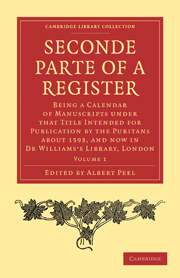 Seconde Parte of a Register
Seconde Parte of a Register PREFATORY NOTE THE EDITOR
Published online by Cambridge University Press: 05 March 2012
Summary
THE purpose of this work is to draw attention and facilitate reference to the earliest—and probably the most important—collection of Puritan manuscripts extant. The manuscripts speak for themselves, and it is unnecessary to say anything here about their nature or contents. For a long period students of Elizabethan ecclesiastical history have desired a Calendar; now an attempt is made to meet the need. Of imperfections in the work one is only too conscious; often reasons of space have compelled a brief and unworthy summary of items which one would have liked to print in full; often laboriously compiled references—valuable for the general reader, but superfluous for the scholars for whose use the Calendar is intended—have had to be omitted; occasionally all efforts to trace allusions have failed. Nevertheless, if the Calendar but saves time for hardpressed workers, and leads students to what the Puritans themselves say, rather than to what others, be they friends or enemies, say about them, it will serve its purpose. It should be added that much care has been expended on the Indexes, in order that they might be of use to local antiquaries, as well as exhaustive for more general workers. My thanks are due to numerous scholars and friends who have helped me, thanks sincerely felt to many who are unnamed as to those now mentioned. To Professor A. J. Grant, of the University of Leeds, who first taught me the meaning of history
- Type
- Chapter
- Information
- Seconde Parte of a RegisterBeing a Calendar of Manuscripts under that Title Intended for Publication by the Puritans about 1593, and now in Dr Williams’s Library, London, pp. xvii - xviiiPublisher: Cambridge University PressPrint publication year: 2010First published in: 1915


